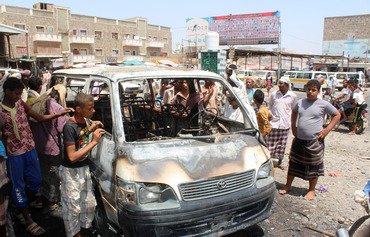Despite new evidence showing it has received large quantities of money to finance operations in Yemen, the "Islamic State of Iraq and the Levant" (ISIL) has no future in the country, experts tell Al-Mashareq.
This is because Yemeni society is highly tribal and inhospitable to terror groups, they say, noting that groups like ISIL and al-Qaeda have exploited the conflict to make territorial gains, and will be weakened once peace in the country is restored .
In a confidential report to the Security Council, UN experts monitoring sanctions on Yemen last month revealed that ISIL had received large quantities of money in March and April, which it used to recruit members, finance its operations and procure weapons.
The report noted the conflict between al-Qaeda in the Arabian Peninsula (AQAP) and ISIL in Yemen, saying al-Qaeda exploited Yemen's war to seize control in southern and eastern areas, while ISIL managed to secure a foothold in the country.
Both groups are currently depleting each other in the race to attract new recruits, according to international media outlets who saw the 105-page report.
Yemen's national committee to combat money laundering and terrorism financing has stressed the importance of severing funding to extremist groups.
In an August 8th statement, the committee said the current situation in Yemen has made it easier for terror groups to conduct money laundering operations and for funds to be transferred to such groups.
This is particularly the case in the southern and eastern areas, which are under the control of extremist groups, the statement said.
Illicit finance
"Through its presence in Hadramaut province, ISIL has hugely benefited from oil sales as well as its control of the port there and oil imports for Marib, Sanaa, al-Jawf and other provinces," said strategic affairs researcher Saeed Abdul Moumin.
This provided the group with an estimated monthly revenue of one billion Yemeni riyals ($4 million), he told Al-Mashareq.
AQAP and ISIL were present in those areas in March and part of April before Yemeni and coalition forces regained control of the port city of al-Mukalla and other parts of Hadramaut province.
"Oil provided the prime source of revenue, in addition to al-Mukalla port, which these groups used to collect tariffs," Abdul Moumin said.
ISIL's subsidiary in Yemen also might be clandestinely receiving money from the parent group, Abdul Moumin said, which uses the illegal sale of Iraqi and Syrian oil to finance its operations.
"There has been news about terrorist groups receiving large injections of cash in al-Mukalla over the past couple of months in the form of tariffs they imposed on maritime and land traffic alongside smuggling operations," said Mohammed Azzan, a researcher who specialises in extremist groups.
Power of tribal system
"ISIL has no future in Yemen due to several factors, the most important of which is that there is no real incubator for the group in Yemen," said political analyst Adnan al-Humairi.
This is partly because "political parties operate overtly rather than covertly", he told Al-Mashareq, adding that "there are Islamic forces that are working in the open and have opposing projects to extremist groups such as ISIL".
The Yemeni people are governed by tribal systems, he said, and "tribes refuse to be under the umbrella of any radical group, even though these groups managed at times to lay claim to certain geographical areas when the state was weak".
These groups soon lose control, he said, as was the case with al-Qaeda in Abyan and al-Mukalla when it was forced to leave on more than one occasion.
"ISIL lacks the political incubator in the form of parties and the social incubator in the form of tribes," he said.
The current situation in Yemen has made it possible for ISIL and other groups to gain a foothold, since the state’s military and security institutions are distracted by the current conflict, war and strife, al-Humairi said.
This has created an economic downturn and security vacuum that made it easier for ISIL to receive money and recruit members, he said, adding that "the return of peace to Yemen and the functioning of the state institutions will weaken these groups immensely".

![Yemenis inspect the site of a suicide car bombing claimed by the 'Islamic State of Iraq and the Levant' on August 29th at an army recruitment centre in Aden. [Saleh al-Obeidi/AFP]](/cnmi_am/images/2016/09/09/6161-Yemen-aden-isisl-600_384.jpg)






